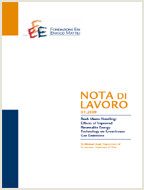Optimal Climate Policy for a Pessimistic Social Planner

20.03.2014
Edilio Valentini, Paolo Vitale
C61, Q54
Climate Change, Climate Policy Targets, Risk Aversion, Pessimism
Climate Change and Sustainable Development
Carlo Carraro
In this paper we characterize the preferences of a pessimistic social planner concerned with the potential costs of extreme, low-probability climate events. This pessimistic attitude is represented by a recursive optimization criterion à la Hansen and Sargent (1995) that introduces supplementary curvature in the social preferences of standard linear-quadratic optimization analysis and, under certain conditions, it can be shown to correspond to the Epstein-Zin recursive utility. The introduction of extra convexity and the separation between risk-aversion and time-preference implies that, independently of the choice of the discount rate, a sharp, early and steady mitigation effort arises as the optimal climate policy, supporting the main recommendation of the Stern Review (Stern, 2007). Nonetheless, we accommodate for its main criticism of using a too low and questionable discount rate (Nordhaus, 2007), while preserving the assumption of a normal (thin-tailed) probability distribution (Weitzman, 2009). Finally, we argue that our theoretical framework is sufficiently general and robust to possible mis-specifications of the model.
***
Suggested citation: Valentini, E., P. Vitale, (2014), ‘Optimal Climate Policy for a Pessimistic Social Planner’, Nota di Lavoro 33.2014, Milan, Italy: Fondazione Eni Enrico Mattei.
